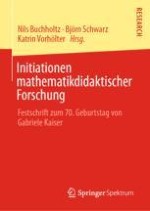2022 | OriginalPaper | Buchkapitel
2. Mathematical modelling – a key to citizenship education
verfasst von : Katja Maass, Michèle Artigue, Hugh Burkhardt, Michiel Doorman, Lyn D. English, Vincent Geiger, Konrad Krainer, Despina Potari, Alan Schoenfeld
Erschienen in: Initiationen mathematikdidaktischer Forschung
Verlag: Springer Fachmedien Wiesbaden
Aktivieren Sie unsere intelligente Suche, um passende Fachinhalte oder Patente zu finden.
Wählen Sie Textabschnitte aus um mit Künstlicher Intelligenz passenden Patente zu finden. powered by
Markieren Sie Textabschnitte, um KI-gestützt weitere passende Inhalte zu finden. powered by
